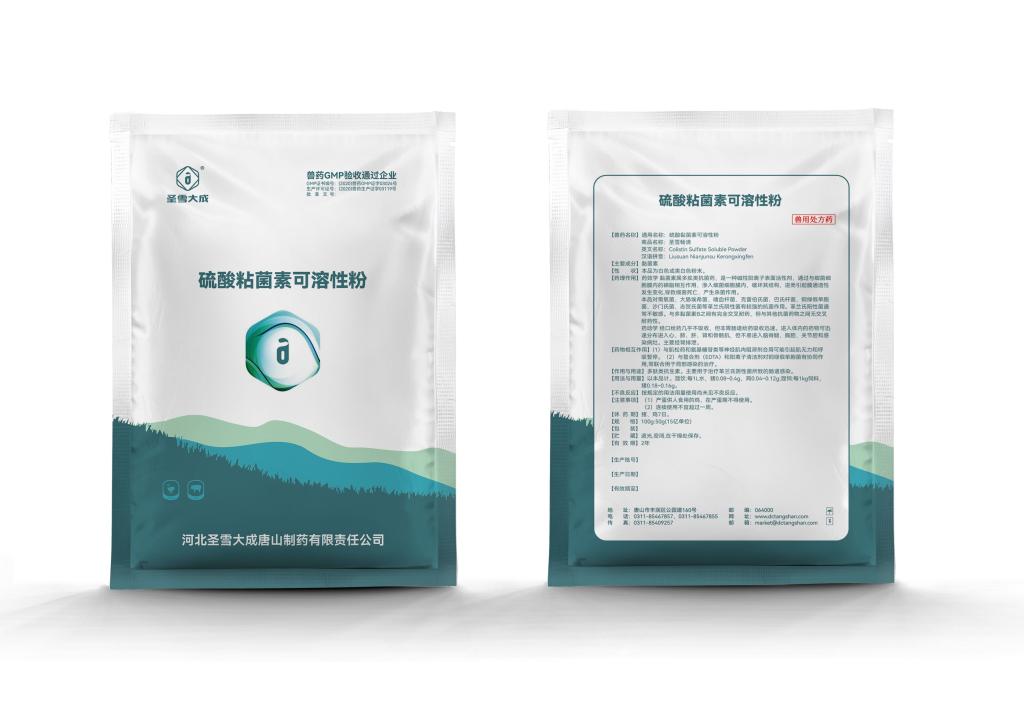Tel:+8618231198596

News
 CONTACT
CONTACT
 CONTACT
CONTACT
- Linkman:Linda Yao
- Tel: +8618231198596
- Email:linda.yao@dcpharma.cn
- Linkman:CHARLES.WANG
- Department:Overseas
- Tel: 0086 0311-85537378 0086 0311-85539701
News
Current Position:
Home >
News
>Colistin Sulfate Soluble Powder: A Critical Component in One Health Strategies.
Colistin Sulfate Soluble Powder: A Critical Component in One Health Strategies.
TIME:2024-01-15
Understanding Colistin Sulfate:
Colistin, also known as polymyxin E, is a broad-spectrum antibiotic primarily effective against Gram-negative bacteria. Colistin sulfate is the salt form of colistin and is commonly used in veterinary medicine as a soluble powder. Its mechanism of action involves disrupting the bacterial cell membrane, making it an effective tool against multidrug-resistant Gram-negative bacteria.
Historical Context and Resurgence:
Colistin was discovered in the 1940s and fell out of favor in human medicine due to concerns about nephrotoxicity and neurotoxicity. However, the global rise of multidrug-resistant bacteria, including the emergence of carbapenem-resistant strains, led to a resurgence of interest in colistin as a last-resort antibiotic. In veterinary medicine, colistin sulfate soluble powder has been employed to combat bacterial infections in animals.
Colistin in Human Medicine:
The use of colistin in human medicine is often reserved for severe infections caused by multidrug-resistant Gram-negative bacteria, such as Pseudomonas aeruginosa, Acinetobacter baumannii, and carbapenem-resistant Enterobacteriaceae (CRE). Colistin is administered intravenously and has been a crucial component in treating infections where other antibiotics have failed. However, concerns about resistance development and its association with adverse effects highlight the need for responsible use.
Colistin Sulfate in Veterinary Medicine:
Colistin sulfate soluble powder is widely used in veterinary medicine to address bacterial infections in animals. It is administered orally, added to feed or drinking water, making it a convenient option for large-scale animal production. The veterinary use of colistin has raised concerns about the potential contribution to AMR, emphasizing the importance of responsible use practices in the agricultural sector.
One Health Approach to Antimicrobial Resistance:
One Health emphasizes the interconnectedness of human, animal, and environmental health, recognizing that the emergence and spread of AMR involve complex interactions across these domains. Colistin sulfate soluble powder plays a role in the One Health approach by addressing bacterial infections in animals, thereby reducing the risk of transmission of resistant strains to humans.
Responsible Use Practices:
Given the importance of colistin in both human and veterinary medicine, responsible use practices are imperative to mitigate the risk of AMR. Key principles of responsible use include:
a. Surveillance: Regular monitoring of bacterial resistance patterns in both human and veterinary settings is crucial for detecting emerging trends and taking timely action.
b. Antibiotic Stewardship: Implementing antibiotic stewardship programs to optimize the use of colistin and other antibiotics, ensuring they are used only when necessary and at appropriate doses.
c. Regulation and Oversight: Stringent regulatory frameworks and oversight mechanisms are essential to control the sale and use of colistin, preventing misuse and overuse.
d. Alternatives and Research: Investing in research to develop alternatives to colistin and exploring new therapeutic options to reduce reliance on critical antibiotics.
Environmental Considerations:
One aspect of the One Health approach involves recognizing the environmental dimension of AMR. The release of antibiotics into the environment, including through the use of colistin in agriculture, can contribute to the development of resistance in environmental bacteria. Addressing this challenge requires a comprehensive understanding of the environmental fate of antibiotics and their impact on ecosystems.
Global Collaboration:
Combatting AMR demands global collaboration and coordination. International efforts, such as the World Health Organization's Global Action Plan on AMR, emphasize the need for a united front against the spread of resistant bacteria. Sharing knowledge, best practices, and research findings on colistin use globally contributes to a collective response to the AMR crisis.
Challenges and Controversies:
The use of colistin, particularly in agriculture, has faced controversies and challenges. Concerns about the potential transfer of resistance genes from animals to humans, as well as the overall impact of agricultural antibiotic use on public health, have sparked debates. Balancing the need for effective disease control in animals with the imperative of reducing antibiotic use in agriculture remains a complex challenge.
Future Outlook:
The future outlook for colistin sulfate soluble powder in One Health strategies involves a multifaceted approach:
a. Research and Development: Continued research into alternative therapies, novel antibiotics, and non-antibiotic interventions to reduce reliance on colistin.
b. Surveillance and Monitoring: Strengthening global surveillance systems to track the prevalence and patterns of colistin resistance in both human and veterinary settings.
c. Education and Awareness: Increasing awareness among healthcare professionals, veterinarians, and the general public about responsible antibiotic use and the consequences of AMR.
d. Policy and Regulation: Enforcing and enhancing policies and regulations to restrict the use of colistin in agriculture and ensure its judicious use in human medicine.
Conclusion:
Colistin sulfate soluble powder is a critical component in One Health strategies to combat AMR. Its role in addressing bacterial infections in both human and veterinary medicine highlights the interconnectedness of health across species and ecosystems. However, the challenges and controversies associated with colistin use necessitate a comprehensive and responsible approach. By adopting stringent surveillance measures, promoting antibiotic stewardship, and fostering global collaboration, the international community can work towards a future where colistin and other critical antibiotics remain effective tools in the fight against bacterial infections. Responsible use practices and a commitment to One Health principles are essential for ensuring a sustainable and resilient approach to addressing the complex challenge of antimicrobial resistance.
- Tel:+8618231198596
- Whatsapp:18231198596
- Chat With Skype







